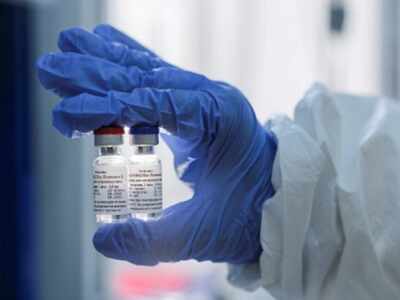
LONDON: The Covid-19 vaccine being developed by Oxford University could be sent to regulators this year, it emerged on Tuesday.
This comes along with the announcement by AstraZeneca, which is helping to test and manufacture Oxford’s vaccine candidate, that the first participants have now been dosed in the clinical trial of its new anti-Covid drug.
Oxford Vaccine Group director Andrew Pollard, at the BBC Radio 4 Today programme, said data from the larger late-stage clinical trials of the vaccine could be sent to the regulators this year.
“It could take as long as winter 2021 to demonstrate a vaccine that works and is safe and then go through the process of regulatory approvals. It is also just possible that if the cases accrue rapidly in the clinical trials, that we could have the data to put before regulators this year — and then there would be a process they go through in order to make a full assessment of the data,” Pollard said.
“You want to have good evidence… around safety of the vaccine and you want to show the vaccine works. Of course it would be AstraZeneca who would then take that forward to regulators,” he added.
Promising results of phase 1 trials from 1,077 volunteers in the UK were published in the Lancet journal in July. Now phase 2 and 3 trials are on in the UK, Brazil and South Africa.
“The combined size of those three trials is 20,000 people. AstraZeneca is hoping to start enrolling 30,000 in the US… The size of trial is not the issue, but you need enough cases accruing during the time of the trials,” Pollard said. “Whether the vaccine is up and running this winter depends on the number of cases that occur in the weeks and months ahead. I think in time, because the virus will continue to transmit in our communities, even with 1,000 people, eventually, you will have enough information to know whether a vaccine works...”
On Tuesday, AstraZeneca announced it had started early stage clinical trials of its anti-Covid drug — AZD7442 — which is a combination of two monoclonal antibodies derived from convalescent patients with SARS-CoV-2 infection.
Synthesised in a laboratory, the monoclonal antibodies aim to mimic natural antibodies. “The treatment has the potential to be given as a preventative option for people exposed to the virus, and to treat and prevent disease progression in patients already infected by the virus,” the company said.
Phase 1 clinical trial of AZD7442 will be on 48 volunteers in the UK, aged between 18 and 55.
This comes along with the announcement by AstraZeneca, which is helping to test and manufacture Oxford’s vaccine candidate, that the first participants have now been dosed in the clinical trial of its new anti-Covid drug.
Oxford Vaccine Group director Andrew Pollard, at the BBC Radio 4 Today programme, said data from the larger late-stage clinical trials of the vaccine could be sent to the regulators this year.
“It could take as long as winter 2021 to demonstrate a vaccine that works and is safe and then go through the process of regulatory approvals. It is also just possible that if the cases accrue rapidly in the clinical trials, that we could have the data to put before regulators this year — and then there would be a process they go through in order to make a full assessment of the data,” Pollard said.
“You want to have good evidence… around safety of the vaccine and you want to show the vaccine works. Of course it would be AstraZeneca who would then take that forward to regulators,” he added.
Promising results of phase 1 trials from 1,077 volunteers in the UK were published in the Lancet journal in July. Now phase 2 and 3 trials are on in the UK, Brazil and South Africa.
“The combined size of those three trials is 20,000 people. AstraZeneca is hoping to start enrolling 30,000 in the US… The size of trial is not the issue, but you need enough cases accruing during the time of the trials,” Pollard said. “Whether the vaccine is up and running this winter depends on the number of cases that occur in the weeks and months ahead. I think in time, because the virus will continue to transmit in our communities, even with 1,000 people, eventually, you will have enough information to know whether a vaccine works...”
On Tuesday, AstraZeneca announced it had started early stage clinical trials of its anti-Covid drug — AZD7442 — which is a combination of two monoclonal antibodies derived from convalescent patients with SARS-CoV-2 infection.
Synthesised in a laboratory, the monoclonal antibodies aim to mimic natural antibodies. “The treatment has the potential to be given as a preventative option for people exposed to the virus, and to treat and prevent disease progression in patients already infected by the virus,” the company said.
Phase 1 clinical trial of AZD7442 will be on 48 volunteers in the UK, aged between 18 and 55.
Download
The Times of India News App for Latest World News

Coronavirus outbreak
Trending Topics
LATEST VIDEOS
More from TOI
Navbharat Times
Featured Today in Travel
Get the app









